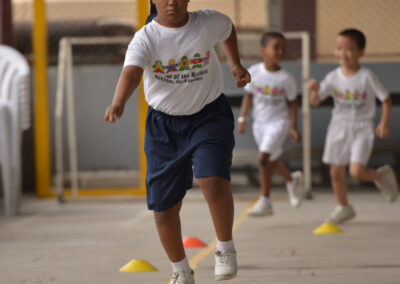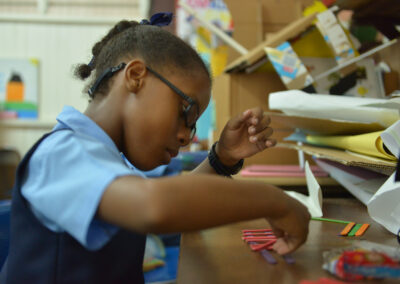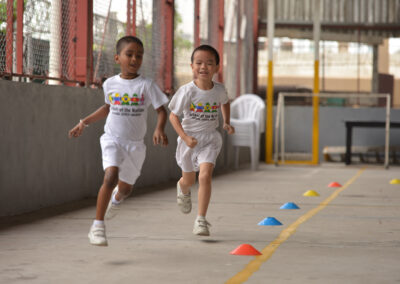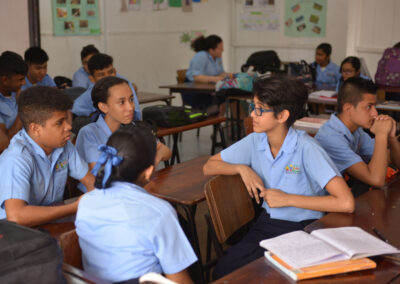Student Life
Understanding that a rich and challenging program extends beyond the classroom, Nations offers abundant opportunities for students to develop their own sense of purpose and passion.
Student Traditions
At Nations, boys and girls interact with one another learning about different cultures, races, traditions and experiences culminating in a love for one another and a desire to promote unity of all people and the equality of man and women. Whether it is indulging in mouthwatering foods on Diwali, Eid or Easter, watching the Mashramani parade together, dressing up for Halloween or fund raising for international causes these beloved Nations moments create an exciting and enthusiastic environment for student to connect with one another and make lifelong friendships.

Diwali
Diwali (also called Divali or Deepavali) is a “festival of lights” that celebrates the triumph of light over dark and good over evil, and the blessings of victory, freedom, and enlightenment. The name comes from Sanksritdipavali, meaning “row of lights.”
Eid al-Adha
Though some Muslims observe other special days throughout the year, including the beginning of the new year according to the Islamic calendar and the day the Prophet Muhammad was born, the two Eids are the only holidays celebrated by the entire Muslim community worldwide.
Easter
On Easter Sunday, Christians celebrate the resurrection of Jesus Christ from the dead after his crucifixion and burial.
Mashramani
Mashramani, often abbreviated to “Mash”, is an annual festival that celebrates Guyana becoming a Republic in 1970. The festival, usually held on 23 February – Guyanese Republic Day – includes a parade, music, games and cooking and is intended to commemorate the “Birth of the Republic”.
Phagwah (Holi)
Holi, also known as the Festival of Colours, Love and Spring, is one of the most popular and significant festivals in Hinduism. It celebrates the eternal and divine love of the god Radha and Krishna.
Emancipation Day
Emancipation Day in Guyana is annually observed on August 1. It marks the abolition of slavery in Guyana and commemorates the end of years of dehumanization and the resurgence of the African spirit. The holiday is significant not just as a calendar event but as a new lease of life for the Guyanese nation as we know it.
Caricom Day
Caricom Day is a public holiday observed annually in Guyana and some parts of the Caribbean on the first Monday of every July. This year, the holiday will be commemorated on July 3. The day commemorates the signing of the Treaty of Chaguaramas on this day in 1973.Caricom is to the Caribbean what the European Union is to Europe.
Youman Nabi Day
Youman Nabi, also known as Mawlid al Nabi, is the celebration of the birthday of the Muhammad, the founding prophet of Islam. Around the Islamic world, Muhammad’s birthday is celebrated with religious lectures and recitals of verses from the Qur’an, in mosques decorated with lights to mark the occasion.
Independence Day
The Cooperative Republic of Guyana celebrates Independence Day on 26th May every year. This holiday commemorates the anniversary of Guyana’s independence from the United Kingdom on the 26th May in 1966, after being ruled by the British for one hundred and fifty-two (152) years. Although the British were the last set of Europeans to govern Guyana, our culture is a mix of the diverse ethnic groups that came to Guyana. As a result, the celebration of Independence Day reflects our rich history and dynamic culture.
Arrival Day
Arrival Day is a public holiday in the Co-Operative Republic of Guyana, observed on May 5th. Also known as Indian Arrival Day, this day commemorates the arrival of the first indentured labourers from India on May 5th 1838.
Clubs and Activities

Primary School
- Robotics
- Choir
- Drama
- Math
- Public Speaking
- Yoga
- Chess
- Debating
- Music
- Science
- Spanish
- Life Skills
- Computer
- Playwriting
- Gardening
- Karate
- Book Club
- Entrepreneurship
- Dance
- Art and Craft

Middle School
- Interact
- Young Artists
- Environmental Club
- The Literary Society
- Nations Wind Ensemble
- Organic Club
- Karate
- Chess
- Debating Society
- Religious Societies: Christian, Hindu, Muslim, Baháʼí
- Spanish Society
- Sports Clubs: Archery, Cricket, Basketball, Football, Table Tennis and Track
- Japanese
- Journalism

High School
- Interact
- Young Artists
- Environmental Club
- The Literary Society
- Nations Wind Ensemble
- Organic Club
- Karate
- Chess
- Debating Society
- Religious Societies: Christian, Hindu, Muslim, Baháʼí
- Spanish Society
- Sports Clubs: Archery, Cricket, Basketball, Football, Table Tennis and Track
- Japanese
- Journalism
School Counselor
The School Counselor offers personalized attention, confidential counseling, classroom instruction on health and wellness, parent education, small group sessions, and developmentally-appropriate guidance to Nations students. Whether it’s body image, eating habits, family pressures, or stress relief, the counselor provides tools and suggests strategies that teach students how to set boundaries, reduce stress, resolve conflict, build confidence, and speak for themselves. In addition to independent guidance, the counselor offers parent and family consultations, supplementary support resources and referrals, transition and intervention services, and collaborative teaching in the health curriculum and advisory program.
The School of the Nations is committed to providing individual counseling and support services across divisions to serve the social and emotional health of students.
This individualized attention from the school counselor is available to every student, for ongoing support or one-time care, as they recognize and pursue their academic and personal goals. The counseling office operates a confidential and open-door policy that is part of the circle of care at Nations.
The Uniform
The uniform is a statement of community and serves to help foster equality between all students. At Nations, we value the inner character of a student rather than his/her outside appearance. In uniform, a child instantly belongs and is equal to one another—becoming part of a community. The child is freed from focusing on his/her appearance and instead directs his/her attention to matters of substance.
Wearing the Nations uniform implies pride in the group. In Primary and Middle School, the uniform is neat, comfortable, and flexible, encouraging active play and learning. The High School uniform is more formal but still very comfortable.




